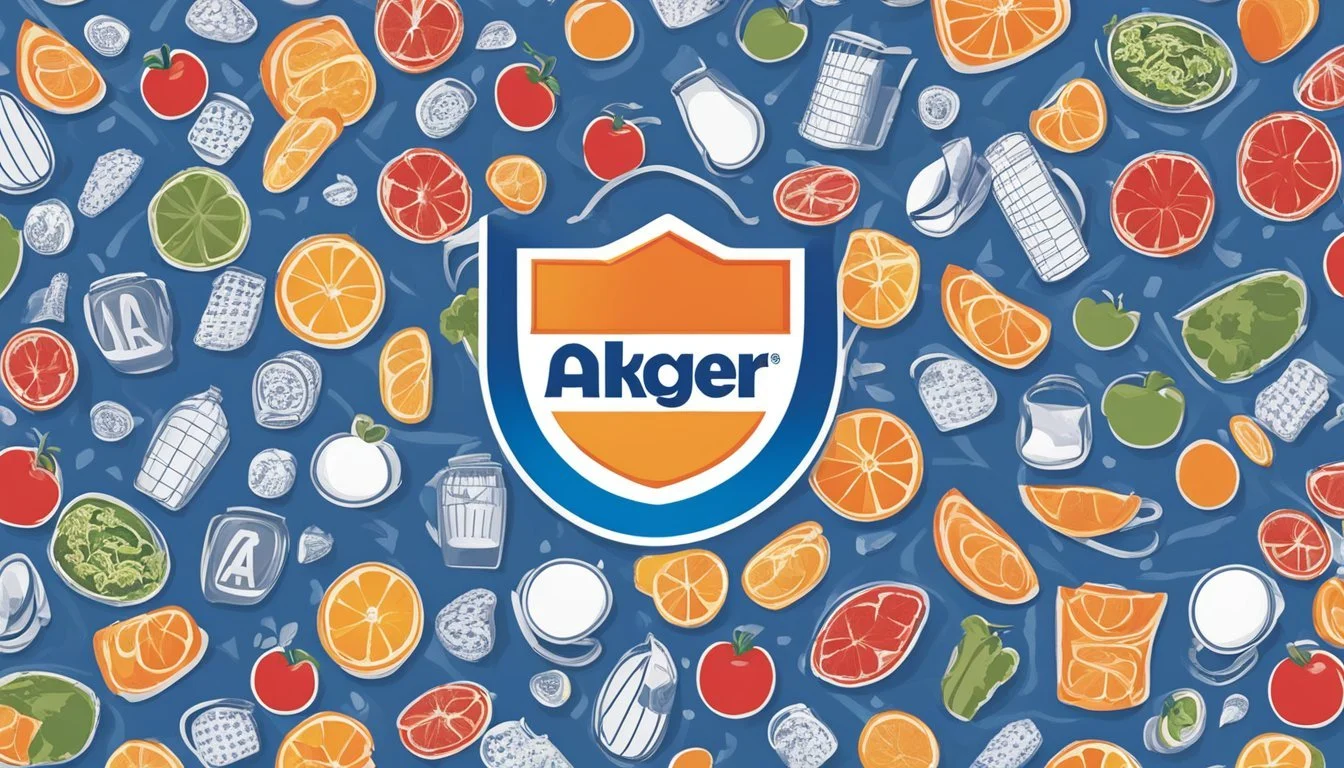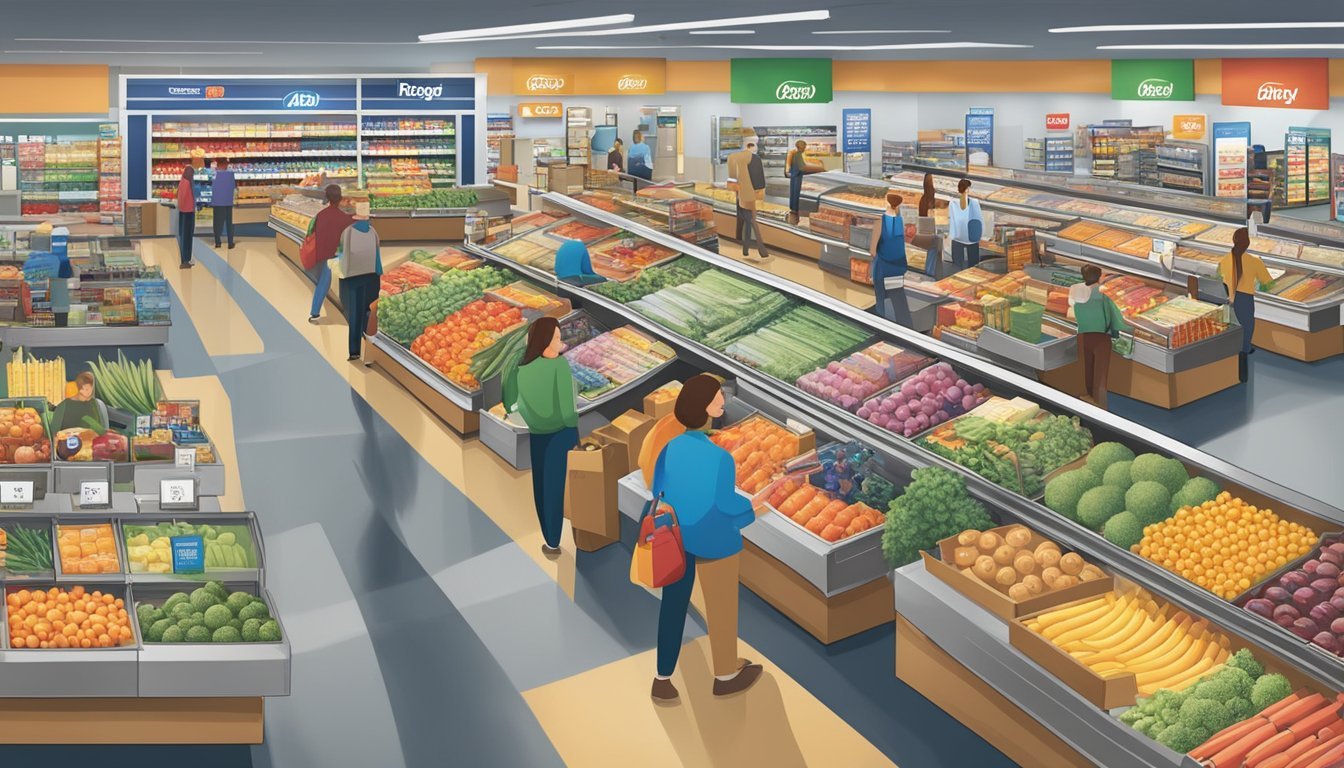Kroger vs Aldi
Comparing Prices, Quality, and Shopping Experience
When it comes to grocery shopping, cost, variety, and quality are three factors that shoppers prioritize. Two of the grocery chains that often come under comparison for providing good value are Kroger and Aldi. Each of these stores has its own business model, with Kroger being recognized for its extensive product range and Aldi for its cost-effective pricing strategy and efficient store layout.
Analyzing the prices of Kroger and Aldi reveals interesting patterns. Typically, Aldi is noted for offering lower prices on many staple items, which is partially attributable to its less-is-more approach to stocking mostly private label products. Kroger, on the other hand, frequently provides promotions through their Kroger Plus Card system and excels in offering a wide selection of both national brands and store brands, catering to customers looking for more product choices.
Quality is another aspect where Aldi and Kroger have their own merits. Aldi's model ensures the quality of its private labels is maintained at a high standard, often matching or exceeding the expectations of their branded counterparts. Kroger, with a bigger variety, offers more options for organic and specialty diet products, accommodating a broader audience. Shoppers often make their choice based on a balance of these factors, aligning with their shopping preferences and priorities.
History and Overview of Kroger and Aldi
Kroger operates as one of the largest supermarket chains in the United States. Established by Barney Kroger in 1883 with an initial investment of $372, the company has evolved significantly over the years. Kroger's philosophy from the start was to offer products that he would personally endorse, maintaining a commitment to quality. Headquartered in Cincinnati, Ohio, Kroger has grown to operate over 2,700 stores across the country, encompassing various supermarket formats that include grocery stores, department stores, and jewelry stores.
On the other hand, Aldi, a leading global grocery retailer, has its roots in Germany. The company's history dates back to 1913, when Karl Albrecht Sr. opened a small store in Essen. By 1946, his sons Karl and Theo Albrecht took over the business and expanded it into a chain. Aldi's business model is centered around high efficiency and offering products at low prices, primarily through a limited assortment of private-label items. Aldi operates more than 10,000 stores worldwide and entered the US market in 1976. Aldi is known for its cost-saving measures, such as a smaller store footprint and a focus on staple items.
While Kroger offers a wider variety of products including its own store brands, Aldi concentrates on providing fewer selections with a primary focus on affordability and quality. Each retailer has carved out a unique niche in the supermarket industry, adapting and growing their customer base through their distinct retail strategies.
Price Comparison Between Kroger and Aldi
When it comes to grocery shopping, consumers are often looking for stores that offer the best prices. This section provides an in-depth look at the prices of groceries at Kroger and Aldi, examines special offers and sales, and uses Walmart as a price benchmark for reference.
Analyzing Grocery Prices
Kroger and Aldi are two leading grocery chains with different pricing strategies. Aldi's focus on private label brands and cost-saving store layouts often leads to lower shelf prices for consumers. Comparative analysis shows significant savings on items like bread and frozen goods at Aldi, sometimes ranging from 6% to 40% cheaper than Kroger. However, when it comes to product categories like beverages, dairy, and personal care, Kroger's prices can range from 1% to 22% cheaper than Aldi, depending on the specific item.
Special Offers and Sales
Both Kroger and Aldi offer weekly sales and special promotions that can lead to additional savings. Kroger frequently offers digital coupons and loyalty card discounts through its Plus Card which can result in price reductions. For example, using a Kroger Plus Card might bring a purchase total from $90.82 to $88.65. Aldi, known as a discount supermarket, doesn't provide traditional coupons, but has its own array of weekly "Aldi Finds" that deliver savings on a variety of products.
Walmart as a Price Benchmark
Walmart is commonly used as a price benchmark in the industry due to its vast presence and aggressive pricing strategies. In comparison to Walmart’s prices, Aldi has been shown to be marginally more affordable on a range of essential grocery items, often by a small percentage, such as 30 cents on a 20-item comparison. Kroger, while offering competitive prices, typically indexes higher than both Aldi and Walmart, suggesting that consumers focused solely on price might find Walmart or Aldi as more cost-effective options.
Product Selection and Quality
When comparing Kroger and Aldi, a discerning shopper will find notable differences in store brands and the quality of produce and meats. Kroger boasts a wider variety of products including national and exclusive brands, while Aldi offers a curated selection with a focus on quality and value.
Comparison of Store Brands
Kroger's inventory includes a significant selection of store brands, like Kroger and Private Selection, alongside national brands, offering a range to consumers from budget-friendly to premium choices. Aldi, on the other hand, primarily stocks its own exclusive brands such as Great Value and Tuscan Garden. These store brands are highly competitive in quality and often priced lower than their name-brand counterparts.
Kroger Store Brands:
Value-oriented: Kroger brand
Premium options: Private Selection
Aldi Store Brands:
Great Value: Known for affordability
Tuscan Garden: Specialty items at competitive prices
Aldi's approach to generic items promises lower costs without significant compromise on quality, particularly appealing to budget-conscious shoppers.
Freshness and Quality of Produce and Meat
The produce section at Kroger typically offers a broad variety of fruits and vegetables, including organic options. Consumers often enjoy the luxury of choice, from common staples to more exotic selections. Aldi has a more selective produce inventory but maintains a reputation for freshness and affordability, emphasizing the quality over quantity.
In the realm of meats, customers at Kroger can expect a wide array, from chicken breasts to pork chops, (What wine goes well with pork chops?) with choices that include both conventional and organic selections. Aldi's meat selection, while more limited, is curated to offer the most commonly purchased items at a value, with the quality consistently meeting or exceeding similar supermarket offerings. Both stores commit to providing quality meat products, yet their strategies diverge on selection and variety.
Affordability and Ways to Save
In the contest of affordability between Kroger and Aldi, shoppers have distinct ways to curb their grocery bills. Both stores offer unique programs and strategies for consumers to save money on their purchases.
Loyalty Programs and Discounts
Kroger operates a robust loyalty program that allows customers to accumulate points that can be used for discounts on fuel amongst other benefits. Shoppers can avail themselves of digital coupons via Kroger's mobile app, combining these with sales to maximize savings. Furthermore, Kroger sometimes offers "Mega Event" sales, where buying specific item combinations reduces the overall cost.
At Aldi, while there is no formal loyalty program, the store delivers cost savings primarily through its private-label brands, which are priced competitively against national brands. Consumers can save around 50% by opting for these Aldi-exclusive labels.
Budget-Friendly Shopping Tips
Consumers can implement several strategies to save money while grocery shopping. Regularly scouring for weekly sales at both Aldi and Kroger can significantly decrease the grocery bill. Meal planning before shopping ensures that purchases are deliberate and based on current deals, thereby reducing waste and incidental spending.
Kroger shoppers should take advantage of digital coupons and the weekly ads to craft their meal plan, focusing on items with the deepest discounts.
Aldi does not accept coupons, so the best strategy here is to base meal plans around their low-cost staples and special "Aldi Finds" deals, which offer discounts on a variety of items from kitchenware to seasonal products.
Grocery Shopping Experience
The grocery shopping experience at a store encompasses factors such as the customer service level and the store's layout. These facets directly affect how shoppers view the convenience and efficiency of their visits.
Customer Service and Convenience
Customer service at Aldi and Kroger is designed to cater to shoppers' needs, with each store offering a distinct approach. Aldi's minimalist staffing model focuses on efficiency, often seen in their swift checkout lines. Aldi also keeps prices low, which contributes to a cost-effective shopping experience. However, this can mean fewer staff available to assist on the sales floor.
In contrast, Kroger boasts a reputation for warm customer service, with more employees available to assist shoppers. The store provides a Plus Card program for discounts and promotional deals, adding a layer of savings convenience for frequent shoppers.
Aldi:
Streamlined service model.
Quick checkout process.
Kroger:
Highly responsive customer service.
Regular discounts with Plus Card.
Store Layout and Navigation
Navigating through Aldi stores tends to be straightforward due to the store's smaller size and consistent layout. Products are displayed in their shipping cartons to reduce restocking time, which might detract from aesthetic appeal but can lead shoppers directly to the deals.
Kroger, with its larger size, presents a wider variety of products and services, such as in-house bakeries and pharmacies. The store layouts at Kroger typically follow a traditional supermarket design, which may be more familiar to shoppers and provides designated sections for specialized goods.
Aldi:
Uniform store design.
Simple, no-frills product presentation.
Kroger:
Comprehensive service departments.
Clearly marked sections for easy navigation.
Product Categories Breakdown
This section provides an in-depth comparison of dairy and bakery items, beverages and dry goods, as well as canned and frozen foods between Kroger and Aldi. It examines the variety, quality, and price points to help consumers make informed decisions.
Comparing Dairy and Bakery Products
Dairy:
Aldi and Kroger offer a selection of dairy products including milk, cheese, yogurt, and cottage cheese. Aldi is known for its competitive pricing, often undercutting Kroger on similar dairy items. Kroger, however, offers a broader variety including organic and lactose-free options.
Milk: Aldi - $2.49/gallon | Kroger - $2.79/gallon
Cheese: Aldi - $1.99/8 oz. | Kroger - $2.49/8 oz.
Bakery:
For bakery items, particularly bread, Aldi offers a smaller but cost-effective range, while Kroger boasts a wider assortment including artisanal and specialty breads.
Bread: Aldi - $1.39/loaf | Kroger - $1.99/loaf (artisanal options higher)
Beverages and Dry Goods
Beverages:
Both stores stock a variety of beverages including coffee and apple juice. Aldi's store brands typically offer lower prices, whereas Kroger features national brands and frequent sales.
Coffee: Aldi - $3.99/12 oz. | Kroger - $5.99/12 oz.
Apple Juice: Aldi - $1.19/64 oz. | Kroger - $1.79/64 oz.
Dry Goods:
Aldi's dry goods, such as spaghetti, are often presented in a no-frill fashion, providing solid quality at lower prices. Kroger offers a larger selection across various brands, including organic and gluten-free options, but generally at a higher price point.
Spaghetti: Aldi - $0.89/16 oz. | Kroger - $1.00/16 oz.
Canned and Frozen Foods
Canned Goods:
Customers can find a range of canned goods like black beans and diced tomatoes at both stores. Aldi's prices for canned goods are frequently less expensive, but Kroger offers a broader selection with additional options like low-sodium or organic.
Black Beans: Aldi - $0.59/can | Kroger - $0.79/can
Diced Tomatoes: Aldi - $0.49/can | Kroger - $0.65/can
Frozen Foods:
For frozen foods, both retailers provide a variety of products including vegetables, meals, and meats. Aldi tends to have lower prices, with its exclusive brands. Kroger counters with a larger array of brand names and specialty items such as exotic meats or vegan alternatives.
Frozen Chicken Breast: Aldi - $6.49/48 oz. | Kroger - $8.99/48 oz.
Consumers' Final Verdict
In the grocery store comparison between Kroger and Aldi, consumers have weighed in with their assessments, considering factors such as price, quality, and selection.
Identifying the Clear Winner
Consumers have determined that when it comes to lower prices, Aldi often emerges as the clear winner. Price tracking has consistently shown that Aldi's prices on a range of items tend to be lower than those at Kroger. Additionally, Aldi's focus on store-brand items has been found to provide as much as a 14% price advantage over Walmart, and an even greater edge over Kroger. This price benefit is recognized by those on tight budgets or seeking to save on their weekly grocery bill.
While Kroger does provide competitive pricing in some categories, and occasionally lower prices for select goods, it generally does not measure up to Aldi's overall pricing advantage. Moreover, Kroger's loyalty card offers additional savings which narrow the gap yet are not enough to claim the winner's spot for pricing. Aldi's strategy of offering a smaller selection, mainly comprising their own private-label brands, contributes significantly to their lower price structure.
The verdict from a price-conscious consumer's perspective identifies Aldi as the clear winner for savings. However, it should be recognized that individual preferences for brand variety and specific product needs might lead different consumers to a different conclusion on which store is the winner for them.




